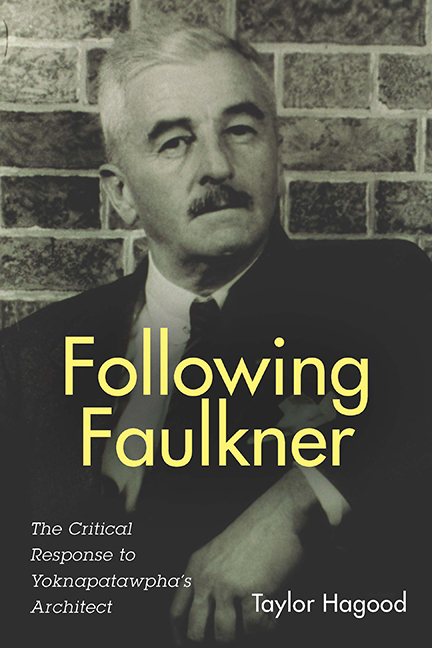2 - From New Critical Heights to Structural and Archival Groundings
Published online by Cambridge University Press: 27 April 2017
Summary
It is hard not to be struck BY the role of the fortuitous timing of critical interest in the making of Faulkner's career. As outlined earlier, he wrote at a moment when influential literary critical figures in the South were looking for a voice to champion as one of southern erudition and artistry in the face of Mencken's dismissal of the South as an artistic wasteland. Later, Faulkner served as the perfect candidate for Cowley's ideas for shaping the American literary scene. Now, in the years following Faulkner's death, his writing as well as his race, gender, class, and regional affiliation matched those of the people who were shaping literary criticism in the United States. Specifically, Faulkner was a convenient darling for the dominant movements of the 1960s and 1970s, New Criticism and structuralism.
New Criticism's investment in Faulkner was the most urgent. Its architects are familiar faces—the Fugitives, turned Agrarians, now turned literary critics. It was one of these men, John Crowe Ransom, who wrote the landmark book entitled The New Criticism (1941), and his cronies, most notably Robert Penn Warren, promoted it. Essentially, New Criticism was a system of analyzing literary texts in which the reader engages in “close reading,” an intense delving into the text driven by a complete faith in the integrity of that text's structure. This technique did not merely require the reader to be attentive to the finer points of the text, it had the very specific goal of discerning paradoxes and ambiguities. New Criticism held that a text is self-sufficient, an organism unto itself, capable of being understood without consulting outside factors such as politics or history or even the author's intentions. While the focus may be exclusively on the text, New Critics nevertheless assumed texts to be ensconced in a larger world they generally considered to be a stable thing, ordered by the Divine (in a Christian sense). It was an approach to literature solidly based on assumed universal ideas about civilization and morality that were largely Christian-based as well as ideas about race, gender, class, and social hierarchy. New Critics of both genders routinely wrote of the nature of “man” and tended to have stereotypical views of “the Woman” or “the Negro.”
- Type
- Chapter
- Information
- Following FaulknerThe Critical Response to Yoknapatawpha's Architect, pp. 25 - 49Publisher: Boydell & BrewerPrint publication year: 2017

